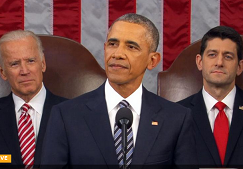Obama in SOTU: We've Protected an Open Internet

The smarter way to stay on top of broadcasting and cable industry. Sign up below
You are now subscribed
Your newsletter sign-up was successful
President Obama stuck generally to the "vision thing" in his last State of the Union (SOTU) speech, talking about his vision of America as a strong, compassionate country that takes care of the poor, the environment and its business at home and abroad. But he also worked in some specifics that resonated with the media community, including trade and an open Internet.
He talked about the need for technological innovation, something Consumer Technology Association had said needed to be in the speech, but did not spend much time on specifics.
He also listed Open Internet rules among the things he said his Administration has done to nurture that spirit of innovation. "We've protected an open internet, and taken bold new steps to get more students and low-income Americans online," he said, an apparent reference to the FCC's E-rate program to boost online access by schools and libraries.
He also called for congressional passage of the Trans-Pacific Partnership, a trade deal backed by the Hollywood TV and movie studios. "we forged a Trans-Pacific Partnership to open markets, protect workers and the environment, and advance American leadership in Asia," he said. "It cuts 18,000 taxes on products Made in America, and supports more good jobs.
With TPP, China doesn't set the rules in that region, we do. You want to show our strength in this century? Approve this agreement. Give us the tools to enforce it."
Hardly had the President finished talking about the importance of the agreement when Motion Picture Association of America chairman Chris Dodd, himself a former Senator, weighed in with an e-mailed statement.
“In tonight’s State of the Union Address, President Obama highlighted the advancement of America’s trade agenda through the Trans-Pacific Partnership (TPP) as a top economic priority for our nation. We share this commitment, because the U.S. film and television industry is a global economic sector that relies on open market access and strong copyright protections to support nearly two million American jobs," he said.
The smarter way to stay on top of broadcasting and cable industry. Sign up below
The President said all the talk about political decline is hot air, as were suggestions that our enemies were getting stronger and the U.S. weaker.
Before the speech, there were reports that the President would reject the rhetoric of Donald Trump, though without calling him out by name. The President took aim at various Trump-isms, including that the country is in decline, that there needs to be a moratorium on Muslim immigration, and more.
"we need to reject any politics that targets people because of race or religion," the President said. "This isn't a matter of political correctness. It's a matter of understanding what makes us strong. The world respects us not just for our arsenal; it respects us for our diversity and our openness and the way we respect every faith. His Holiness, Pope Francis, told this body from the very spot I stand tonight that "to imitate the hatred and violence of tyrants and murderers is the best way to take their place." When politicians insult Muslims, when a mosque is vandalized, or a kid bullied, that doesn't make us safer. That's not telling it like it is. It's just wrong. It diminishes us in the eyes of the world. It makes it harder to achieve our goals. And it betrays who we are as a country."
South Carolina governor Nikki Haley, who provided the Republican response, also suggested that the volume should be turned down on the divisive political rhetoric so people could do some more listening.
The President called for campaign finance reform. "We have to reduce the influence of money in our politics, so that a handful of families and hidden interests can't bankroll our elections," he said, "and if our existing approach to campaign finance can't pass muster in the courts, we need to work together to find a real solution."
Contributing editor John Eggerton has been an editor and/or writer on media regulation, legislation and policy for over four decades, including covering the FCC, FTC, Congress, the major media trade associations, and the federal courts. In addition to Multichannel News and Broadcasting + Cable, his work has appeared in Radio World, TV Technology, TV Fax, This Week in Consumer Electronics, Variety and the Encyclopedia Britannica.

